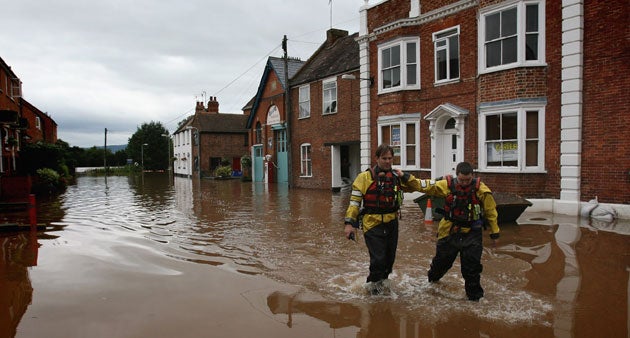Michael McCarthy: Another summer of sodden misery. Is it bad luck – or worse?

It's getting wearisomely familiar, isn't it? Last summer's toll of sodden misery is with us again as people are flooded out of their homes from one end of the land to the other and, for the second year running, a famous medieval abbey is an island. You could be forgiven for thinking, is this really all just coincidence?
Perhaps it is. But perhaps it isn't – that's an increasingly real possibility. It may be this is very much the shape of the future as climate change takes hold.
The qualification to remember is that weather and climate are not the same. Weather is what happens over this week; climate is what happens over this century. There is great variability in weather and very wet times do occur from time to time, perfectly naturally, and meteorologists and climate scientists are very reluctant to ascribe any single weather event to the influence of a changing climate. In fact, this has only been done once in western Europe, with the heatwave of August 2003, which killed 18,000 old people in Paris and was so far off the scale in terms of temperature extremes that scientists have no doubt that global warming played a part in its ferocity.
So you are unlikely to find a responsible scientist openly attributing the marooning of Tewskesbury to climate change. Yet. The proximate cause of this year's wet summer is known – the shifting southwards of the jetstream, the rapidly moving band of air between the polar and the tropical zones that directs the course of low-pressure systems across the Atlantic, and that may be caused by La Nina, the occasional cooling of the central and eastern parts of the Pacific ocean, and next year the picture may look very different.
On the other hand, there are some points that appear increasingly telling. Since the big floods of the autumn of 2001, which John Prescott, then in charge of the environment, described as "a wake-up call" from climate change, major inundations have started to occur with a regularity that was absent in the 20th century.
And the unusually heavy rain of the past two summers is certainly consistent with predictions of what will happen in Britain with global warming (a warming atmosphere holds more moisture).
Sir Michael Pitt, who reported to the Government two-and-a-half months ago on last summer's floods, certainly took the view that the future held more of the same.
He said that the importance of flood risk should now be "brought up alongside the risk of terrorism or a major flu pandemic" and to emphasis this, there should be a cabinet committee concerned solely with flooding. It is slowly starting to dawn on people that the future is not only hot – the future is wet.
Subscribe to Independent Premium to bookmark this article
Want to bookmark your favourite articles and stories to read or reference later? Start your Independent Premium subscription today.

Join our commenting forum
Join thought-provoking conversations, follow other Independent readers and see their replies